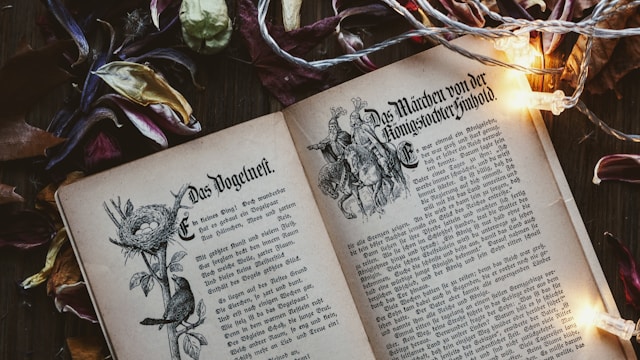Beyond the pages: examining the fine line between literary escape and obsession
In a world where reality can often feel overwhelming, books offer a unique refuge – an escape into worlds of fantasy, adventure, and profound human emotion. We immerse ourselves between the pages, seeking solace in the lives of fictional characters, distancing ourselves from the harsh realities of life. Literature provides us with a door into worlds unknown: into warm, fire-lit living rooms where little women laugh, into hedonistic parties seeping with indulgence and chaos, and into forbidden forests filled with eerie silence, untold dangers and ancient magic. But what happens when this form of escapism exceeds a mere hobby? When does the line between literary indulgence blur into actuality? Allow me to dive into the fine line that distinguishes healthy literary escape and the consuming pull of obsession – exploring why we read, how stories captivate us, and the dangers of getting lost beyond the pages.
Books provide an escape from the ongoing tension and unpredictable nature of life itself, allowing us to explore new concepts, perhaps within both academia and fiction
For many, reading is a form of relaxation. Books provide an escape from the ongoing tension and unpredictable nature of life itself, allowing us to explore new concepts, perhaps within both academia and fiction. From childhood through adulthood, the desire to escape through literature is almost instinctual. Very often, reading fulfils a deeper human connection, fostering empathy as we navigate the struggles, emotions, and triumphs of fictional characters. This element of fulfilment may, however, ‘fill’ a void moulded originally for real human experiences. Amid the Covid-19 pandemic, book sales and reading rates spiked worldwide. Lockdowns and social isolation meant that many people turned to literature as a coping mechanism, nurturing this notion of escapism. This allowed readers to transport their minds to alternate realities where life was predictable, for example, where they have the option of skipping several chapters ahead and spoiling the ending. However, much like other forms of escapism, such as daydreaming or potentially overeating, this ‘healthy’ habit of reading can spiral into something less healthy.
The reader soon becomes immersed too deeply into fictional tales and loses their ability to engage with the outside world
The reader soon becomes immersed too deeply into fictional tales and loses their ability to engage with the outside world, fixating on fictional characters and storylines to the detriment of their realities. Because reading is perceived as such a productive or even virtuous activity, this literary obsession can go unnoticed.
As reading experienced a resurgence during the Covid-19 pandemic, social media contributed to this significant role in shaping the way that people consume and share literature. Platforms such as TikTok or even Instagram Reels became breeding grounds for book-related content, particularly through the phenomenon known as BookTok. BookTok created this sense of community, allowing users to exchange book recommendations, reviews, and connect with others who share their passion for literature. However, BookTok’s rapid social nature crafts an extreme sense of urgency, leading to a cycle of overconsumption (and severe FOMO). Readers may feel obligated to read certain books, which adds to this incessant pressure of keeping up with the latest trends leading to overabsorption of content, which majorly contributes to this notion of indulgence, crossing the boundary between literary escape and obsession.
Within this space, a specific trend that gained momentum was DracoTok, a subsection of BookTok where readers obsessed and romanticised the character of Draco Malfoy in ways that went far beyond J. K Rowling’s original portrayal – I’m talking borderline insane. His character was glorified to new extremes which encouraged this unhealthy fantasy regarding relationships, skewing the reader’s views on real-life dynamics. This mention of DracoTok leads me to focus on the broader fascination that people have with the Harry Potter universe. For many readers, the seven books, the eight movie franchise and excessive Primark collection were not enough. No, for some fans, their connection to the characters and the world has grown so deep that they engage in a practice known as ‘shifting’. For those of you blissfully unaware of shifting, shifting is a form of lucid dreaming or meditation where people claim to ‘shift’ their consciousness into fictional universes, particularly into the world of Harry Potter. The seductive nature of ‘shifting’ into alternative fantasies to escape reality, fosters the notion that nothing is harmless if consumed in excessive quantities.
turning this unique refuge into a fatal obsession
This indulgence in literature can lead to compulsive reading habits and an unbalanced relationship between reality and fiction, where the joy of reading is lost to the pursuit of withdrawing from the real world; turning this unique refuge into a fatal obsession.

Comments